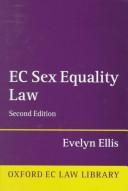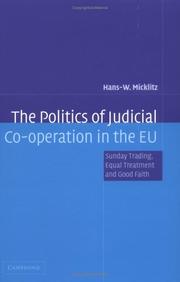| Listing 1 - 10 of 16 | << page >> |
Sort by
|
Book
ISBN: 9781849467636 1849467633 9781509906215 9781509906239 Year: 2017 Publisher: Oxford: Hart,
Abstract | Keywords | Export | Availability | Bookmark
 Loading...
Loading...Choose an application
- Reference Manager
- EndNote
- RefWorks (Direct export to RefWorks)
Since the year 2000, the material and personal scope of EU non-discrimination law has been significantly broadened and has challenged national courts to introduce a comprehensive equality framework into their national law to correspond with the European standard. The book provides a multi-layered culturally informed comparison of juridical approaches to EU (in)direct sex and sexualities discrimination and its implementation in Germany and the Netherlands. It examines how and why national courts apply national non-discrimination law with a European origin differently, although the legislation derives from the same set of EU law and the national courts have to respect the interpretive competence of the CJEU. The book provides valuable insights into the national and European context which shape the dialogue and influences of the courts inter se, the national application of EU law, and the harmonisation process within the area of gender equality law and beyond. A Dutch and German comparison is of special interest here because both countries' approaches towards non-discrimination law are quite different despite the similarities in the respective legal systems; they are founding members of the EU, they are neighbours, they are civil law countries, and their legal systems are relatively similar at least compared to Scandinavian and common law jurisdictions. Therefore, the different reception EU non-discrimination law cannot simply be explained by obvious differences between the legal systems. Their comparison thus provides an interesting case study to uncover legal and non legal, cultural and historic, factors which influence the application of EU non-discrimination law in both countries. The book is of interest for EU, comparative and equality lawyers.
Book
ISBN: 1854187546 Year: 2010 Publisher: London : Thorogood Publishing,
Abstract | Keywords | Export | Availability | Bookmark
 Loading...
Loading...Choose an application
- Reference Manager
- EndNote
- RefWorks (Direct export to RefWorks)
This practical briefing for employers and their advisers will ensure that you do not fall foul of the law on age and all the other anti-discrimination law.

ISBN: 280271208X 9602329467 9782802712084 Year: 1998 Publisher: Bruxelles: Bruylant,
Abstract | Keywords | Export | Availability | Bookmark
 Loading...
Loading...Choose an application
- Reference Manager
- EndNote
- RefWorks (Direct export to RefWorks)
Women --- Femmes --- Legal status, laws, etc. --- Droit --- Sex discrimination --- Equality before the law --- Law and legislation --- 396.1 --- 347.1 --- Equal rights --- Civil rights --- Justice --- Equal rights amendments --- Equality before the law. --- Law and legislation. --- Sex discrimination - Law and legislation
Book
ISBN: 9782807913585 280791358X Year: 2019 Publisher: Bruxelles: Larcier,
Abstract | Keywords | Export | Availability | Bookmark
 Loading...
Loading...Choose an application
- Reference Manager
- EndNote
- RefWorks (Direct export to RefWorks)
De zesde staatshervorming heeft de bevoegdheid inzake jeugddelinquentie overgeheveld naar de gemeenschappen. Na een uitgebreid voorbereidend traject en enkele hindernissen in het wetgevingsproces, krijgt Vlaanderen een eigen jeugddelinquentierecht dat de Jeugdbeschermingswet van 1965 en 2006 grotendeels zal vervangen.00Het Vlaamse Jeugddelinquentiedecreet treedt in werking op 1 september 2019 en zal een grote impact hebben op praktijk, beleid en onderzoek. Het is cruciaal dat alle betrokkenen op geïnformeerde wijze aan de slag kunnen gaan met de nieuwe wetgeving. Dit verslagboek biedt een duidelijk overzicht van het Vlaamse jeugddelinquentierecht: de basisprincipes, de algemene structuur, de vernieuwingen en de praktische gevolgen daarvan.
Criminology. Victimology --- Criminal law. Criminal procedure --- Family law. Inheritance law --- strafrecht --- criminologie --- jongerencriminaliteit --- Flanders --- E-books --- Jeugdrecht --- Juvenile delinquency --- Délinquance juvénile --- Belgium --- Child --- KJK - Belgium --- legislation and jurisprudence --- Sex discrimination Law and legislation --- Young Adult --- Belgique
Book
ISBN: 9789059388925 9059388925 Year: 2005 Publisher: Bruxelles: Kluwer,
Abstract | Keywords | Export | Availability | Bookmark
 Loading...
Loading...Choose an application
- Reference Manager
- EndNote
- RefWorks (Direct export to RefWorks)
1. Violence et harcèlement sexuel ou moral au travail: cadre historique et principes généraux - 2. Le rôle du conseiller en prévention psychosocial - 3. L'inspection médicale et la législation violence au travail - 4. L'expérience de l'auditorat du travail de Charleroi - 5. Harcèlement et rupture du contrat de travail - 6. Harcèlement: référé, médiation et conciliation - 7. Harcèlement, violence au travail et risque professionnel - Bibliographie - Index
KJK 1 Law of Belgium --- Belgium --- Sex discrimination Law and legislation --- REGLEMENTATION DU TRAVAIL --- HARCELEMENT MORAL --- HARCELEMENT SEXUEL --- VIOLENCE --- CONTRAT DE TRAVAIL --- TRAVAIL --- RUPTURE --- PREVENTION DU RISQUE PROFESSIONNEL --- Pesterijen --- Arbeidsrecht --- Geweld --- Colloquia

ISBN: 0471964360 9780471964360 Year: 1996 Volume: *2 Publisher: Chichester: Wiley,
Abstract | Keywords | Export | Availability | Bookmark
 Loading...
Loading...Choose an application
- Reference Manager
- EndNote
- RefWorks (Direct export to RefWorks)
Discrimination in employment --- Equal pay for equal work --- Sex discrimination --- Discrimination dans l'emploi --- Egalité de rémunération --- Discrimination sexuelle --- Law and legislation --- Droit --- Egalité de rémunération --- European Union countries --- Sex discrimination in employment --- Sex discrimination - Law and legislation - European Union countries. --- Éducation, formation --- Book
Book
ISBN: 2717827994 9782717827996 Year: 1995 Volume: 21 Publisher: Paris : Economica,
Abstract | Keywords | Export | Availability | Bookmark
 Loading...
Loading...Choose an application
- Reference Manager
- EndNote
- RefWorks (Direct export to RefWorks)
Women --- Men --- Freedom of information --- Persons (Law) --- Femmes --- Hommes --- Liberté d'information --- Personnes (Droit) --- Legal status, laws, etc. --- Droit --- Civil rights --- Sex discrimination --- International and municipal law --- Law and legislation --- Liberté d'information --- Civil rights - European Economic Community countries. --- Sex discrimination - Law and legislation - European Economic Community countries. --- Freedom of information - European Economic Community countries. --- International and municipal law - European Economic Community countries.

ISBN: 0198262248 9780198262244 Year: 1998 Publisher: Oxford : Clarendon press,
Abstract | Keywords | Export | Availability | Bookmark
 Loading...
Loading...Choose an application
- Reference Manager
- EndNote
- RefWorks (Direct export to RefWorks)
Sex discrimination --- Sex discrimination in employment --- Equal pay for equal work --- Law and legislation --- Discrimination, Sexual --- Gender discrimination --- Sexual discrimination --- Discrimination --- Sexism --- Gender mainstreaming --- Discrimination in employment --- Wages --- Women --- Employment --- Sex discrimination - Law and legislation - European Union countries --- Sex discrimination in employment - Law and legislation - European Union countries --- Equal pay for equal work - Law and legislation - European Union countries
Book
ISBN: 9781509917211 1509917217 1509917225 1509917233 9781509917228 Year: 2019 Publisher: Oxford: Hart,
Abstract | Keywords | Export | Availability | Bookmark
 Loading...
Loading...Choose an application
- Reference Manager
- EndNote
- RefWorks (Direct export to RefWorks)
"This is the first generalist text to tackle the intersection of law and gender in this jurisdiction for over two decades, and it could hardly have come at a more opportune moment. Among scholars and policy-makers alike, the regulation of gendered bodies, and the legal status of sexual and gendered identities, is now a highly visible fault line in public discourse. Debates over reproductive justice (exemplified by the recent referendum to remove the 8th Amendment), increased rights for lesbian, gay, bisexual and transgender persons (including the public-sanctioned introduction of same-sex marriage) and the historic mistreatment of women and young girls have re-shaped Irish public and political life, and encouraged Irish society to re-examine long-unchallenged gender norms. While many traditional flashpoints, such as abortion and prostitution/sex work, remain, new questions have emerged, including surrogacy and the gendered experience of asylum frameworks. As policy-makers seek to enact reforms, they face a population with increasingly polarised perceptions of gender and a legal structure ill-equipped for modern realities. This volume directly addresses modern Irish debates on law and gender. Providing an overview of the existing rules and standards, as well as exploring possible options for reform, the collection stands as an important statement on the law in this jurisdiction, and as an invaluable resource for pursuing gendered social change. While the edited collection applies a doctrinal methodology to explain current statutes, case law and administrative practices, it also invokes critical gender, queer and race perspectives to identify and problematise existing (and potential) challenges" "Law and Gender in Modern Ireland: Critique and Reform is the first generalist text to tackle the intersection of law and gender in this jurisdiction for over two decades. As such, it could hardly have come at a more opportune moment. The topic of law and gender, perhaps more so than at any other time in Irish history, has assumed a dominant place in political and academic debate. Among scholars and policy-makers alike, the regulation of gendered bodies, and the legal status of sexual and gendered identities, is now a highly visible fault line in public discourse. Debates over reproductive justice (exemplified by the recent referendum to remove the '8th Amendment'), increased rights for lesbian, gay, bisexual and transgender persons (including the public-sanctioned introduction of same-sex marriage) and the historic mistreatment of women and young girls have re-shaped Irish public and political life, and encouraged Irish society to re-examine long-unchallenged gender norms. While many traditional flashpoints, such as abortion and prostitution/sex work, remain, there are also new questions, including surrogacy and the gendered experience of asylum frameworks, which have emerged. As policy-makers seek to enact reforms, they face a population with increasingly polarised perceptions of gender and a legal structure ill-equipped for modern realities. This edited volume directly addresses modern Irish debates on law and gender. Providing an overview of the existing rules and standards, as well as exploring possible options for reform, the collection stands as an important statement on the law in this jurisdiction, and as an invaluable resource for pursuing gendered social change. While the edited collection applies a doctrinal methodology to explain current statutes, case law and administrative practices, the contributors also invoke critical gender, queer and race perspectives to identify and problematise existing (and potential) challenges. The edited collection is essential reading for all who are interested in law, gender and processes of social change in modern Ireland"
Sex and law --- Gender identity --- Sex discrimination --- Law reform --- Law and legislation --- Sexualité et droit --- Identité sexuelle --- Discrimination sexuelle --- Droit --- Réforme --- Sex and law - Ireland --- Gender identity - Law and legislation - Ireland --- Sex discrimination - Law and legislation - Ireland --- Law reform - Ireland --- Irlande --- Law and sex --- Sex --- Sex crimes --- Discrimination à l'égard des minorités sexuelles

ISBN: 9780521825160 0521825164 9780511495021 1107137624 051118140X 0511113315 0511299133 0511495021 1280434759 0511198108 0511112807 9780511113314 9780511112805 9781280434754 Year: 2005 Publisher: Cambridge: Cambridge university press,
Abstract | Keywords | Export | Availability | Bookmark
 Loading...
Loading...Choose an application
- Reference Manager
- EndNote
- RefWorks (Direct export to RefWorks)
The European legal order is largely based on judicial co-operation between the European Court of Justice and the national courts. Three case studies on Sunday trading, on equal treatment of men and women and on good faith in contract law reveal that national courts and national litigants are mainly pursuing national interests by means of European law. The European Court of Justice seeks European solutions by delimiting the scope of the European legal order, by transforming the subjective rights of market citizens into political rights of union citizens, and by developing European remedies to enforce European rights.
Law of civil procedure --- Human rights --- European law --- European Union --- International and municipal law --- Judicial process --- Sunday legislation --- Sex discrimination --- Good faith (Law) --- Law and legislation --- Blue laws --- Law, Sunday --- Sunday --- Ecclesiastical law --- Hours of labor --- Labor laws and legislation --- Weekly rest-day --- Holidays --- Sabbath legislation --- Store hours --- Discrimination, Sexual --- Gender discrimination --- Sexual discrimination --- Discrimination --- Sexism --- Gender mainstreaming --- Decision making, Judicial --- Judicial behavior --- Judicial decision making --- Judges --- Law --- Procedure (Law) --- Bona fides (Law) --- Bad faith (Law) --- Ignorance (Law) --- Mistake (Law) --- Psychological aspects --- Interpretation and construction --- General and Others --- International and municipal law - European Union countries. --- Judicial process - European Union countries. --- International and municipal law - Great Britain. --- Sunday legislation - England. --- Sunday legislation - European Union countries. --- Sex discrimination - Law and legislation - England. --- Sex discrimination - Law and legislation - European Union countries. --- Good faith (Law) - England. --- Good faith (Law) - European Union countries.
| Listing 1 - 10 of 16 | << page >> |
Sort by
|

 Search
Search Feedback
Feedback About UniCat
About UniCat  Help
Help News
News